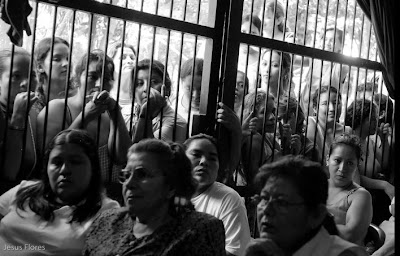Women in prison

Women in Ilopango prison -- photo by Jesus Flores A friend of mine left for El Salvador today on a medical and holistic healing trip to El Salvador. As part of this trip, her team has been invited to provide medical screening within a women's prison in El Salvador. She asked me to write a post about the conditions of incarceration for women imprisoned in El Salvador. According to the most recent statistics , this month there are 2648 women prisoners who make up 9.8% of the total prison population in El Salvador. Children under age 5 can stay with their mothers in the prison. When you research prison conditions for these women, you get two different pictures. The official picture from the government's prison administration shows women inmates participating in a variety of activities in attractive surroundings. There is the: Celebration of elderly women prisoners event Christmas Pageant in the Ilopango prison. Graduat...
